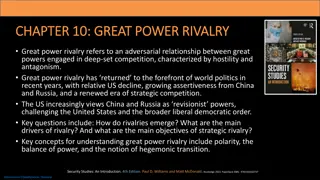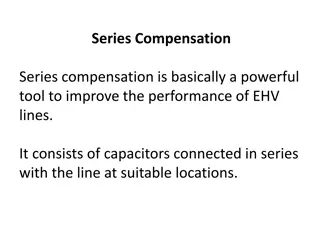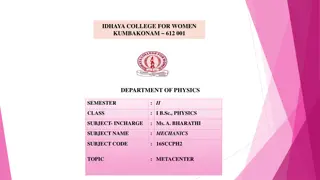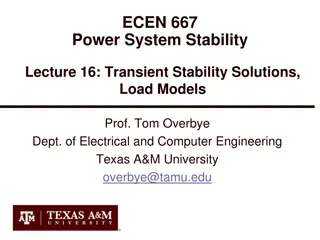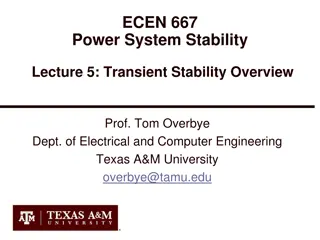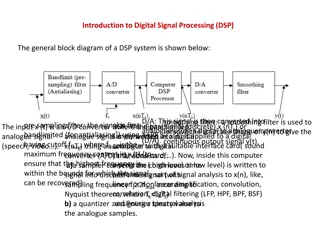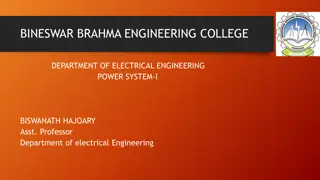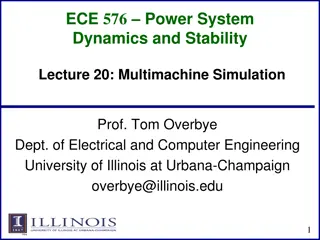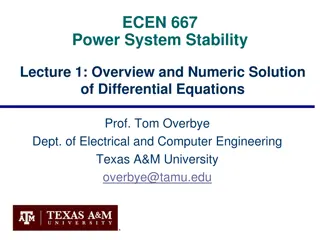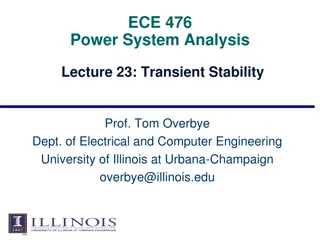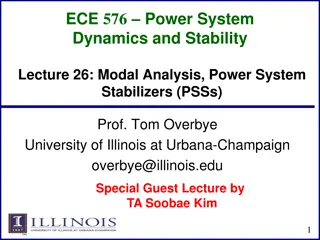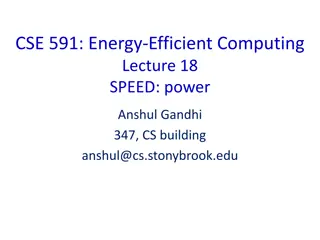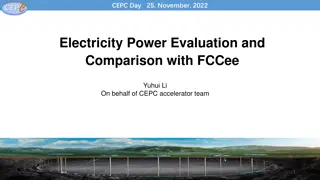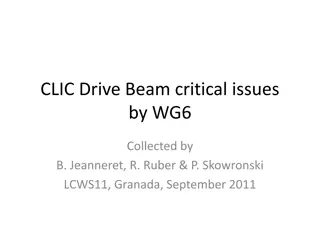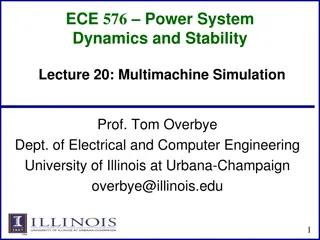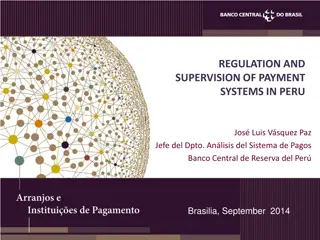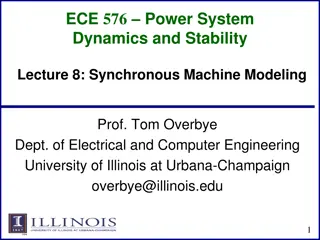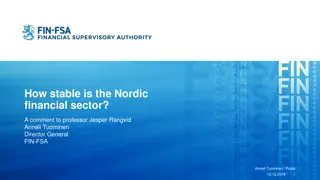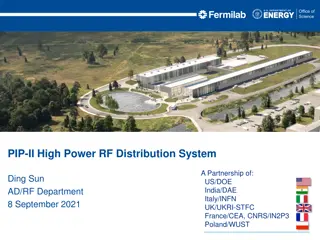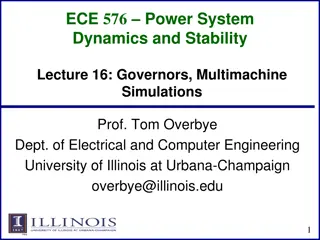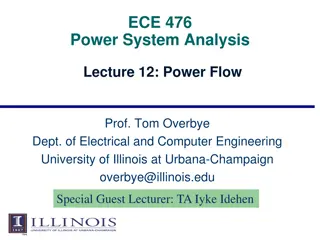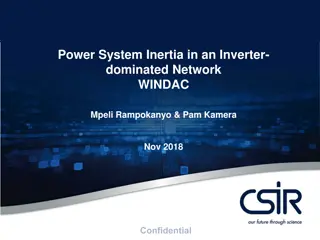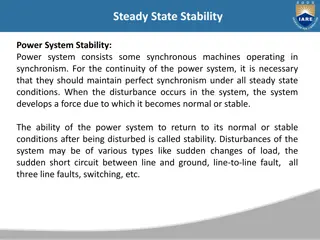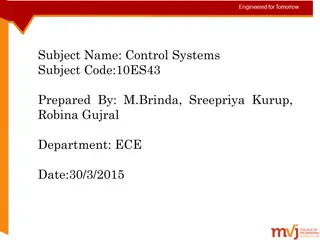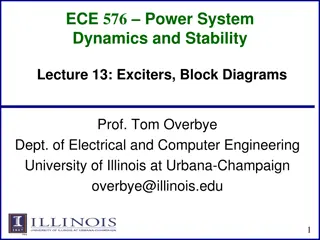Cisco Systems Fault Managed Power Portfolio Overview
Cisco Systems offers an industry-leading Fault Managed Power (FMP) patent portfolio comprising 24 active assets across seven INPADOC families. The portfolio includes patents supporting fault-managed power systems, PoE deployments, DC power distribution, DC-DC conversion, and HVDC connectors. The FMP
4 views • 4 slides
Hungarian Banking System Stability Report May 2023
The Financial Stability Report for May 2023 of the Hungarian banking system highlights the resilience of banks despite international failures. The report discusses indicators of financial stability, risks faced by banks, and the sector's robust capital position. There are insights on private sector
5 views • 32 slides
Great Power Rivalry in World Politics: Understanding Polarity, Balance of Power, and Hegemonic Transition
Great power rivalry involves deep competition and hostility between major players like the US, China, and Russia. The concept is explored through polarity, balance of power, and hegemonic transition theories, discussing power distribution, strategies, and transitions in the international system. The
4 views • 12 slides
How Do I Troubleshoot The BMW Stability Control Warning Light
Go through this presentation to find out why your BMW's stability control warning behaves strangely and how to fix it. Learn about the function of stability control and common causes of warning light activation, from low tire pressure to sensor issues. Follow troubleshooting tips and prioritize safe
3 views • 14 slides
Understanding Nuclear Structure and Forces in Physical Science
Explore the fascinating world of nuclear structure and reactions within atoms, delving into concepts such as nuclear force, binding energy, mass defect, and nuclear stability. Discover the intricacies of nucleons, neutron stars, and the Band of Stability, along with magic numbers that contribute to
6 views • 9 slides
Understanding Basic Meteorology Concepts for Air Quality Management
Pollutants circulate in the troposphere following air movement patterns around low-pressure fronts and high-pressure systems. Anticyclones and cyclones play a crucial role in atmospheric stability and pollutant dispersion. The relationship between lapse rates determines air stability and pollutant d
0 views • 24 slides
Enhancing Performance of EHV Lines through Series Compensation
Series compensation, involving connecting capacitors in series with electrical transmission lines, aims to improve EHV line performance by decreasing transmission impedance and enhancing voltage stability and transient stability. The method is a robust tool to optimize power transmission efficiency.
0 views • 51 slides
Understanding Metacentre and Metacentric Height in Fluid Mechanics
Exploring the concept of metacentre in fluid mechanics, where it is the theoretical point that determines the stability of floating bodies. The metacentric height (GM) is crucial in assessing the initial static stability of a floating object. Learn how the metacentre is defined and its significance
0 views • 15 slides
Understanding Chemical Bonding and Stability in Atoms
Explore the significance of chemical bonds in providing stability to atoms through ionic and covalent bonding mechanisms. Learn about valence electrons, types of bonds, and why atoms form bonds for enhanced stability.
0 views • 16 slides
Power System Stability Lecture: Transient Solutions and Load Models
This lecture delves into transient stability solutions and load models in power systems. It covers the simultaneous implicit method for solving algebraic and differential equations, focusing on the Trapezoidal approach for linear systems. The discussion extends to nonlinear cases, particularly using
0 views • 47 slides
Power System Transient Stability Overview: ECEN 667 Lecture Summary
This summary covers the key points discussed in the lecture on transient stability in power systems by Professor Tom Overbye at Texas A&M University. Topics include contingency analysis, results interpretation, PowerWorld Simulator usage, plotting results, and more. Detailed information is provided
0 views • 43 slides
Understanding Digital Signal Processing (DSP) Systems: Linearity, Causality, and Stability
Digital Signal Processing (DSP) involves converting signals between digital and analog forms for processing. The general block diagram of a DSP system includes components like D/A converters, smoothing filters, analog-to-digital converters, and quantizers. DSP systems can be classified based on line
1 views • 12 slides
Baltic Synchronization Plan and Frequency Stability Study
The Baltic Synchronization Plan explores the outcomes of the Frequency Stability Study, focusing on the effects on synchronous areas and the ENTSO-E procedure. It delves into scenarios involving existing and new HVDC links between countries like Poland and Lithuania, emphasizing the importance of th
0 views • 19 slides
Understanding Aircraft Stability and Manoeuvrability
Exploring the principles of flight, this content covers how the stability of an airplane is maintained, the forces involved in aircraft motion, and stability objectives related to different axes of rotation and planes of movement. It also delves into the effects of dihedral and anhedral on stability
1 views • 45 slides
Overview of Power Systems and Energy Generation
The power system encompasses generation, distribution, and transmission systems that convert various forms of energy, such as coal and diesel, into electrical energy. Energy cannot be created or destroyed but can only be transformed from one form to another. Generation involves converting primary en
3 views • 30 slides
Understanding Power System Dynamics and Stability with Prof. Tom Overbye
Explore the concepts of governors in power systems, learn about the upcoming midterm exam, view the best HW4 result, delve into speed and voltage control, understand the role of prime movers and governors, and discover the impact of power grid disturbances. Enhance your knowledge of power system dyn
7 views • 28 slides
Understanding Ship Stability: Centre of Gravity and Metacentre
Exploring the concepts of transverse statical stability, centre of gravity, centre of buoyancy, metacentre, stable equilibrium, unstable equilibrium, and neutral equilibrium in ship stability. The relationship between these key points determines a ship's stability and ability to maintain a steady po
0 views • 8 slides
Power System Dynamics and Stability: Multimachine Simulation with Implicit Methods
This lecture covers the use of simultaneous implicit and nonlinear trapezoidal methods for solving power system dynamics and stability in multimachine simulations. Techniques such as Newton's method for resolving algebraic equations alongside differential equations are discussed, offering numerical
0 views • 28 slides
ECEN 667 Power System Stability: Overview by Prof. Tom Overbye at Texas A&M University
In this comprehensive course on power system stability, Prof. Tom Overbye from Texas A&M University covers topics ranging from electromagnetic transients to energy function methods. The course provides insights into modeling synchronous machines, transient stability, signal analysis, and more. Prof.
0 views • 35 slides
Power System Analysis Lecture: Transient Stability with Prof. Tom Overbye
In Lecture 23 of ECE 476, Prof. Tom Overbye discusses transient stability in power systems. Topics include power system time scales, frequency variations, dynamics behavior, grid disturbances, and power flow analysis. Announcements regarding assignments and exams are also highlighted.
1 views • 25 slides
Design for Stability - Direct Analysis Method CE 470 (Fall 2016) Saahastaranshu R. Bhardwaj
Stability in structural design is crucial for the safety and performance of compression members, elements, and frames. This content focuses on the Direct Analysis Method (DAM) as a rational approach to considering stability in structural engineering. Factors influencing stability, second-order effec
1 views • 29 slides
Power System Dynamics and Stability: Modal Analysis and PSSs
This lecture discusses modal analysis and Power System Stabilizers (PSSs) in power system dynamics and stability, covering topics such as eigenvalue calculations, generator models, and exciter effects. Key papers and examples are provided to enhance understanding and application in power systems eng
0 views • 27 slides
Exploring Power Efficiency in Computing Systems
In this lecture series on energy-efficient computing, various concepts related to dynamic frequency scaling, power capping, power shifting, power modeling, and power measurement are discussed. The impact of power on server speed is explored, alongside strategies for improving performance within powe
0 views • 17 slides
Comparison of Electricity Power Systems Between CEPC and FCCee
The evaluation and comparison of electricity power systems between the CEPC and FCCee accelerators reveal the power breakdowns, RF power consumption, magnet power supply, and overall power usage. Differences in power consumption for various components such as RF, magnets, and vacuum systems are high
0 views • 19 slides
Critical Issues in CLIC Drive Beam by Working Group 6 at LCWS11
Issues identified in the CLIC Drive Beam project include RF stability and reliability, beam current stability, RF deflectors in combiner rings, synchrotron radiation power, beam dynamics, operability concerns, machine protection, and beam synchronization challenges. Key areas requiring attention inc
0 views • 5 slides
Power System Dynamics and Stability: Multimachine Simulation Lecture Overview
This presentation covers the concepts of simultaneous implicit integration for solving differential equations in power system dynamics. Key topics include the advantages of simultaneous implicit methods, nonlinear trapezoidal integration using Newton's method, and the application of implicit solutio
0 views • 28 slides
Regulation and Supervision of Payment Systems in Peru
Peru has seen significant economic growth and stability from 2004 to 2013, enhancing confidence in the payment system. The Central Reserve Bank of Peru plays a crucial role in ensuring systemic stability, oversight, and efficiency in payment systems. Supervision is necessary to safeguard public obje
0 views • 24 slides
Power System Dynamics and Stability Lecture 8: Synchronous Machine Modeling
This lecture focuses on modeling synchronous machines for power system dynamics and stability analysis. Topics include load modeling, dynamic load models, and comparing results with different load characteristics. The content also covers commercial transient stability packages and adding detailed lo
0 views • 37 slides
Advanced Solutions for Concrete Dam Assessment
Utilizing advanced methods for the assessment of existing concrete dams is crucial for ensuring their stability and safety. This project focuses on analyzing the stability of small concrete dams in Norway built between 1950-1970, which may not meet current safety standards. The study involves evalua
0 views • 12 slides
Rent Increase Policy Overview by Housing Stability Council
The Rent Increase Policy established by the Housing Stability Council aims to balance financial sustainability with resident stability in affordable housing. The policy allows for rent increases up to 5%, with reviews required for higher increases. Stakeholder feedback, unique market conditions, and
1 views • 11 slides
Overview of Nordic Financial Sector Stability
The stability of the Nordic financial sector has been examined in relation to past crises and indicators like rapid credit growth and house prices. While the current situation seems stable, risks remain, especially with low interest rates impacting households and banks. Lessons from the 2008 crisis
0 views • 8 slides
Overview of Unified Power Flow Controller (UPFC) in Power Systems
A Unified Power Flow Controller (UPFC) is a combination of a Static Synchronous Compensator (STATCOM) and a Static Synchronous Series Compensator (SSSC) interconnected via a common DC link. UPFC allows bidirectional flow of real power and provides concurrent real and reactive series line compensatio
0 views • 20 slides
Understanding Leadership and Power Dynamics
Power and leadership are interconnected concepts, with power being the measure of a person's ability to influence others. Leaders have power in various situations, but it does not necessarily mean having power over people. Effective leaders balance their use of power with knowledge and trust, knowin
0 views • 9 slides
PIP-II High Power RF Distribution System Overview
The PIP-II High Power RF Distribution System is a collaborative project involving various countries and institutions to develop a sophisticated system capable of efficiently distributing RF power to superconducting cavities. The system consists of multiple distribution lines and components designed
0 views • 28 slides
Understanding Power System Dynamics and Stability: Governors and Deadbands
Explore topics covered in a lecture on power system dynamics and stability, including governors, multimachine simulations, and the IEEE G1 turbine model. Learn about deadbands, different types, and their implementation to prevent excessive responses in power systems.
0 views • 29 slides
Power System Analysis: Lecture on Power Flow
Lecture 12 on Power Flow Analysis in Power Systems covers the use of power balance equations when analyzing complex power consumption and generation. It explains the derivation of real power balance equations for iterative solutions in power flow analysis. The lecture highlights the need for iterati
0 views • 30 slides
Understanding Power System Inertia in Inverter-Dominated Networks
This study explores the impact of high levels of instantaneous inverter-based renewable energy penetration on power system inertia. It delves into fundamental concepts of energy balance, frequency control, load/frequency characteristics, and the importance of system inertia in maintaining grid stabi
0 views • 20 slides
Understanding Power System Stability: Synchronous Machines and Dynamics
Power system stability is crucial for maintaining synchronism and continuity. It includes steady-state and transient stability, with dynamics of synchronous machines playing a key role. Different types of disturbances can affect stability, requiring a system's ability to adjust and return to normal
0 views • 73 slides
Stability Analysis in Control Systems
Stability analysis in control systems is crucial for ensuring the predictability and reliability of system responses. It involves assessing various stability criteria such as Routh Stability Criterion and investigating the behavior of systems under different conditions like bounded inputs. Understan
0 views • 29 slides
Power System Dynamics and Stability: Exciters and Block Diagrams Overview
Explore the concepts of exciters and block diagrams in power system dynamics and stability through lectures by Prof. Tom Overbye at the University of Illinois. Learn about IEEE exciter models, including the evolution from T1 to DC1A, and delve into block diagram basics for simulating power system mo
0 views • 31 slides


